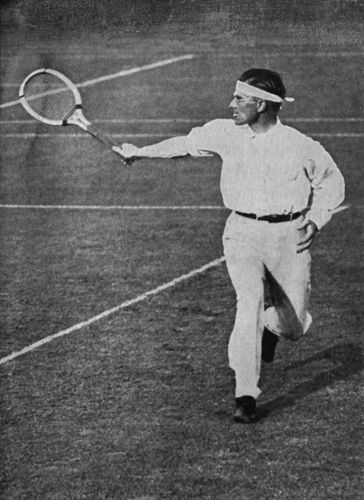Two Titanic survivors, tennis pros Richard Williams and Karl Behr, met for a match in Boston several months after the disaster. In “Unsinkable,” L. Jon Wertheim’s excellent new Sports Illustrated story, the writer recalls their dramatic stories. An excerpt that imagines the shipwreck occurring in our media-drenched era:
“Imagine the Titanic sinking not in 1912 but in 2012. Passengers’ Twitter feeds and Facebook posts would describe the disaster in real time as they were rescued. Cable networks would provide round-the-clock coverage, complete with theme music, a catchphrase—Catastrophe at Sea!—and digital animation of the sinking. Morning shows would book survivors, literary and film agents would hustle story rights, class-action lawyers would troll for clients. Just see the media frenzy that followed the sinking of the Italian luxury cruise linerCosta Concordia earlier this year.
Now consider a scenario in which two of the survivors were dashing, world-class athletes in the same sport, destined to face off against each other many times. The hype surrounding those matches would be immeasurable. After their playing careers, the two men would be bracketed together—the Ralph Branca and Bobby Thomson of the sea—perhaps cowriting a book, then hitting the speaking circuit.
A century ago the culture was different. Look-at-me sensibilities were considered gauche. Many passengers lucky enough to have ended up on the Carpathia struggled with what today would be diagnosed as post–traumatic stress disorder. This was especially true for the men, whose survival was seen by some as evidence of cowardice. Ismay, the White Star director, was pilloried in the British newspapers. Ostracized by London society, he moved to Ireland and spent the remaining 25 years of his life out of the public eye.
Behr, according to family members, suffered profound survivor’s guilt. His granddaughter Helen Behr Sanford, known as Lynn, spent 10 years meticulously researching his story and recently published Starboard at Midnight, a fictionalized account of Behr’s experience on the Titanic. ‘He wished he had saved someone from the water so that at least an act of heroism could have resulted from his survival,’ she writes. ‘He was crushed by [an] inarticulate sadness beyond anyone’s understanding.'” (Thanks Browser.)

